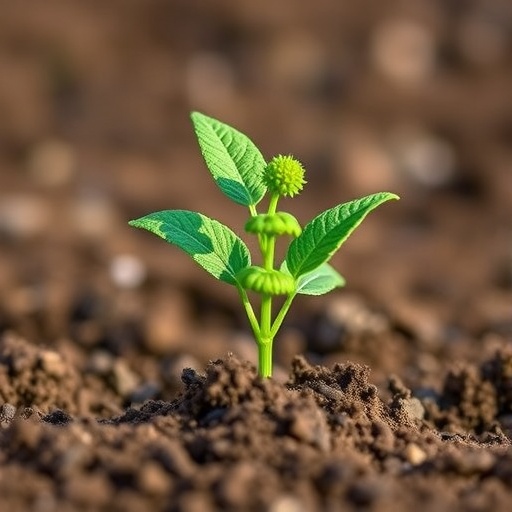New research is fundamentally shifting our understanding of how soil microorganisms interact with their environment, revealing that these microbial communities possess a form of ecological memory that enables them to adapt to past environmental stresses such as drought. This discovery, emerging from pioneering work led by the University of Nottingham in close collaboration with the University of Kansas, uncovers the crucial role soil microbiota play in mediating plant resilience to increasingly frequent and severe droughts due to climate change.
The biotic dynamics within soil have long been overshadowed by studies focusing primarily on plants and climatic conditions. Yet, the new study, published in the prestigious journal Nature Microbiology, elucidates how soil microbes carry a lasting imprint of historical precipitation patterns. This microbial memory manifests in changes to the community composition and gene expression profiles that directly influence how plants respond to new environmental challenges, particularly prolonged water scarcity.
By meticulously analyzing soil samples from six distinct prairie ecosystems across Kansas, which experience markedly different rainfall regimes, the research team was able to identify causal relations between precipitation history and microbial functional traits. These soils provided a natural experiment setting where differences in long-term hydrological conditions had already sculpted microbial communities in distinct ways. Employing advanced sequencing technologies and metagenomic approaches, the researchers pinpointed specific microbes and genetic pathways that distinguish dry-adapted microbial assemblages from those found in wetter environments.
Subsequent experimental drought simulations with a native prairie grass revealed a striking phenomenon: plants growing in soils harboring microbial legacies of dryness demonstrated enhanced drought tolerance. This suggests that microbial communities originating from historically arid soils have evolved mechanisms that bolster plant performance under water-limited conditions. However, the benefits conferred by these microbial legacies were not universal across all plant species; notably, maize, a staple crop, did not exhibit similar improvements, pointing to complex plant-microbiome specificity in drought adaptation strategies.
At the heart of these findings lies the concept of “legacy effects,” wherein microbes encode and recapitulate environmental information over temporal scales that extend well beyond a single season. This ecological memory enables microbial populations to precondition plants via biochemical signaling, modulation of root exudates, and alteration of soil nutrient cycling under conditions of stress. The multidisciplinary team explored gene families linked to stress response, osmoprotectant synthesis, and signal transduction pathways, revealing molecular signatures indicative of long-term adaptation to drought.
From a mechanistic perspective, soil microbial communities may alter root architecture and physiology through the production of phytohormones such as abscisic acid and auxins, or by regulating hydraulic conductivity in soil microenvironments. These sophisticated interactions foster a microhabitat that promotes plant water use efficiency and nutrient uptake during drought events. Moreover, microbial biofilms and extracellular polymeric substances can improve soil structure and moisture retention, all contributing to plant survival in arid conditions.
Dr. Gabriel Castrillo, leading the Nottingham team, emphasizes the transformative potential of this research. He highlights that understanding microbial legacies can revolutionize agricultural practices by informing the design of climate-resilient cropping systems. As drought frequency escalates due to global warming, harnessing the adaptive capacity of soil microbiomes could reduce the need for irrigation, stabilize yields, and improve ecosystem sustainability.
Beyond agriculture, this research has broad implications for natural ecosystems facing unprecedented climatic volatility. By mapping how microbial memories influence ecosystem functions such as carbon sequestration and nutrient cycling, scientists can better predict and manage ecosystem responses under future environmental stressors. The cross-disciplinary collaboration showcased in this study integrates microbial ecology, plant biology, and climate science to tackle pressing challenges posed by global change.
The findings also urge a reconsideration of current soil management practices, which often overlook the complex microbial networks underpinning soil health. Regenerative and conservation agriculture could benefit from fostering microbial communities adapted to environmental extremes, thereby strengthening ecosystem resilience. Future research agendas are poised to delve deeper into the genetic and epigenetic mechanisms underpinning microbial memory and to explore the translatability of these findings to diverse crops and soil types worldwide.
This study represents a paradigm shift in how scientists conceptualize the soil plant interface, suggesting that the microbiome acts almost as an environmental sensor and memory bank. It advances the frontier of ecological research by positioning microbes as active architects of plant adaptation, rather than passive inhabitants of the soil matrix. The integration of experimental results with field observations provides robust evidence that legacy effects are a critical determinant of plant survival under drought stress.
In conclusion, this groundbreaking research unveils a previously underappreciated dimension of plant resilience driven by microbial legacy effects. As climate models predict sustained increases in drought incidence, the ability to manipulate and harness soil microbial memory offers a promising avenue for bolstering food security and ecosystem stability globally. This intricate microbial-plant dialogue underscores the necessity of preserving soil biodiversity as a frontline defense against climate adversity.
Subject of Research:
Not applicable
Article Title:
Precipitation legacy effects on soil microbiota facilitate adaptive drought responses in plants
News Publication Date:
30-Oct-2025
Web References:
https://doi.org/10.1038/s41564-025-02148-8
References:
Castrillo, G., et al. Precipitation legacy effects on soil microbiota facilitate adaptive drought responses in plants. Nature Microbiology, 2025.
Keywords:
soil microbiota, ecological memory, drought stress, microbial legacies, plant-microbe interactions, climate resilience, soil ecology, metagenomics, prairie grass, adaptive responses, drought tolerance, microbial gene expression




